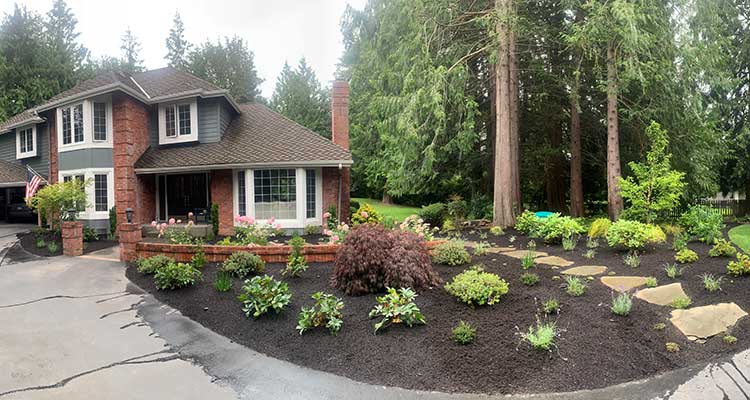Written By: Bear Creek Landscaping Team ~
1/5/2023

A beautifully designed and well-constructed landscape can transform your outdoor space into a stunning retreat, enhancing the overall appeal and value of your property. Building your dream landscape requires careful planning, the right materials, and a clear vision. In this comprehensive guide, we will walk you through the process of landscape construction, from the initial planning stages to the final touches.
Planning and Design
The first step in building your dream landscape is developing a clear vision of what you want to achieve. Consider your lifestyle, preferences, and the existing features of your property. Start by setting specific goals, such as creating an outdoor living space for entertaining, a play area for children, or a peaceful retreat to unwind.
Sketch out a rough design or consult with a professional landscape designer to create a detailed blueprint. When planning your landscape, consider factors such as:
- The size and layout of your property
- Existing features and structures
- Sunlight exposure and microclimates
- Drainage and soil conditions
- Local climate and plant hardiness zones
Choosing the Right Materials
Selecting the right materials for your landscape construction project is crucial to achieving a cohesive and aesthetically pleasing design. Consider the following materials:
- Hardscaping: Pavers, natural stone, concrete, and wood are popular choices for creating pathways, patios, and retaining walls.
- Plants: Choose a variety of trees, shrubs, and flowers that thrive in your local climate and require a level of maintenance you can manage.
- Outdoor Furnishings: Select durable and weather-resistant furniture that complements your landscape's style.
Landscape Features and Elements
Incorporating various features and elements can enhance the functionality and aesthetic appeal of your landscape. Some popular options include:
- Patios and Decks: Create a comfortable outdoor living space for entertaining, dining, or relaxing.
- Water Features: Fountains, ponds, and waterfalls add visual interest and a soothing ambiance.
- Outdoor Kitchens: Incorporate a grill, refrigerator, and sink for convenient outdoor cooking and dining.
- Garden Structures: Arbors, pergolas, and gazebos can provide shade and support for climbing plants.
Plant Selection
Choosing the right plants is essential for a thriving and visually appealing landscape. Consider the following factors when selecting plants:
- Climate: Select plants that are well-adapted to your region's climate and hardiness zone.
- Soil Type: Choose plants that can thrive in your property's specific soil conditions.
- Sunlight Exposure: Consider the sunlight requirements of each plant and place them accordingly.
- Maintenance: Opt for low-maintenance plants if you have limited time or resources for upkeep.
Hiring Professionals
Hiring professional landscape designers and contractors can ensure your project is executed to the highest standards. To find and vet qualified professionals, consider the following tips:
- Ask for recommendations from friends, family, or online review platforms.
- Verify licenses, certifications, and insurance coverage.
- Request a portfolio of previous work and client references.
- Obtain multiple quotes and compare services, timelines, and costs.
Project Execution
With a solid plan and the right professionals in place, it's time to execute your landscape construction project. The process typically involves:
- Site preparation, including clearing, grading, and excavation.
- Installation of hardscaping elements, such as patios, pathways, and retaining walls.
- Planting trees, shrubs, and flowers.
- Installing outdoor features, such as lighting, water features, and garden structures.
- Cleanup and final touches, including mulching, edging, and lawn installation.
Maintenance and Upkeep
To ensure the longevity and beauty of your dream landscape, regular maintenance and upkeep are essential. Consider the following tips for maintaining various landscape elements:
- Lawns: Mow regularly, aerate, and fertilize according to the grass type and local climate.
- Plants: Prune, water, and fertilize plants as needed, and apply mulch to conserve moisture and suppress weeds.
- Hardscaping: Clean and inspect surfaces, repair any damage, and reseal or treat materials as required.
- Outdoor Features: Clean and maintain water features, inspect and repair lighting, and protect outdoor furniture from the elements.
Sustainability and Eco-Friendly Practices
Embrace sustainable landscaping by incorporating eco-friendly materials, techniques, and design principles into your landscape construction project:
- Use locally sourced, recycled, or sustainable materials for hardscaping and outdoor features.
- Opt for native plants that are well-adapted to your local climate and require less water and maintenance.
- Implement water-saving measures, such as drip irrigation systems and rainwater harvesting.
- Incorporate permeable paving materials to reduce stormwater runoff and improve drainage.
Building your dream landscape requires careful planning, material selection, and attention to detail. By following the steps outlined in this comprehensive guide, you'll be well on your way to creating an outdoor space that is both beautiful and functional, tailored to your unique preferences and lifestyle. Whether you tackle the project yourself or enlist the help of professional landscape designers and contractors, the result will be a stunning landscape that enhances the value and appeal of your property for years to come.
